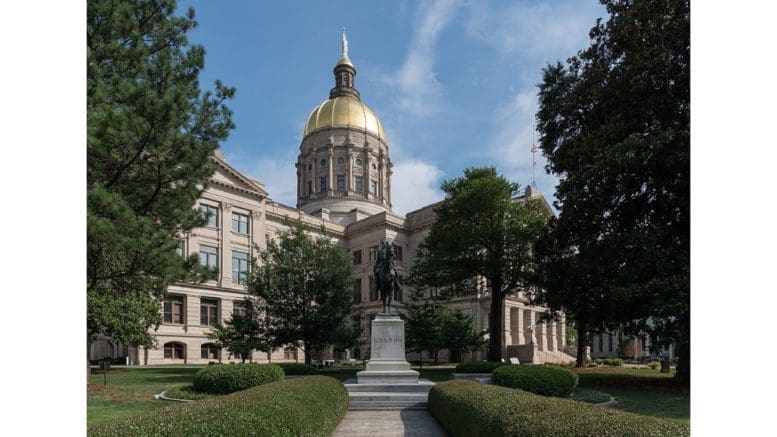by Ross Williams, Georgia Recorder [This article first appeared in the Georgia Recorder, republished with permission]
March 14, 2024
A school voucher bill with the backing of powerful Republican leaders passed the House 91-82 Thursday and could be headed to the Senate for a final vote.
The main part of the bill would allow parents of children in the bottom quartile of public schools to accept $6,500 to pull them out and send them to private school or teach them at home.
As she presented the bill, Speaker Pro Tem Jan Jones said state funds are already used for private schools through programs like pre-K and dual enrollment for private colleges.
“Even though we made the choice to send our children to public school, as a mother, and now as a grandmother, I’ve never wanted fewer opportunities for my children,” she said. “And I was glad that there were a limited number of charter schools and a targeted school voucher program are two that the state currently had to provide options. Even though we did not exercise them. I have rarely encountered regular citizens who wanted fewer options.”
Jones said the bill will give parents another option if their local public school doesn’t suit their children. Voucher skeptics say because public schools are funded per child, taking kids out would leave struggling schools with less money to improve.
Last year, those skeptics included 16 House Republicans, who joined nearly all Democrats to scuttle a voucher bill.
Jones and other Republican leaders sought to make voting for this year’s effort more enticing by adding a raft of broadly popular education measures, including codifying teacher pay raises and allowing SPLOST money to be used for building or renovating pre-K facilities. This year’s bill adds some testing requirements — private schools would test voucher students in math and language arts and submit their scores to the state. The program’s cost would be capped at 1% of the state’s Quality Basic Education formula, or about $140 million, which would accommodate about 21,500 students.
New kindergarteners would qualify for the voucher immediately, but kids in other grade levels would be required to have spent a year in public school to qualify.
“By voting yes, on this bill, you are voting yes to codify an increase to teacher pay,” said Peachtree Corners Republican Scott Hilton. “By you voting yes on this bill, you’re voting for pre-K funding. By voting yes on this bill, you are increasing the tax credit that goes to our public schools.”
“This is an easy bill to vote for because you can go back to your constituents and say, ‘Listen, instead of giving you less options, I’ve given you more. And I’ve invested in public education, in our state’s students, and I’ve given them a lifeline,’” he added.
The additions seemed to do the trick – eight of last year’s no votes switched to yes this year, and one was not present for the vote. Support from powerful Republicans like Speaker Jon Burns and Gov. Brian Kemp likely didn’t hurt either.
But most Democrats said those benefits were not worth the harm they said the bill could bring. Augusta Democratic Rep. Karlton Howard said because typical tuition at private schools is well above $6,500, the bill would primarily benefit better-off families and leave lower income families at a disadvantage, exacerbating the disparity between the rich and poor.
“This bill, ultimately, what it does is perpetuate inequality in our educational system,” he said. “And frankly, I’m not swayed by the promise of teacher pay raises or kindergarten improvements if it comes at the cost of defunding our public schools.”
Macon Democratic Rep. Miriam Paris was more blunt.
“It is not only a pig with lipstick, ladies and gentlemen, it is a pig with lipstick, mascara, foundation, blush, and all of the rest,” she said. “I think that this House doesn’t need a big lecture on it, and I think that we can do better.
Most of the Republicans opposed to last year’s bill voted yes on Thursday, but a few stuck to their guns, like Pine Mountain Rep. Vance Smith, who said his wife is a retired teacher.
Smith echoed Democrats in suggesting improving public schools rather than offering a way out.
“When the dust settles, you still got children in the classroom,” he said. “We’ve got children in Harris County that live with their grandmama. They live with their aunt. What are we doing for those children that are left in the classroom? Are we raising that level of education for those children?”
One former Democrat took issue with that argument.
“What is the Democrat battle cry? The Democrat battle cry is ‘Do this instead,’” said Atlanta Republican Rep. Mesha Mainor, who switched parties after breaking ranks in last year’s voucher vote. “We admit there’s a problem. We admit that the schools are failing, we admit that the children are not learning. We admit all of those things, but let’s not give them a choice.”
Mainor said she was raised in a rough part of Atlanta and credited her mother for sending her to another school outside of her district.
The bill could be headed to the Senate, which passed last year’s version without the additions. Kemp has indicated he looks forward to signing the bill. If he does, it will go into effect for the 2025-2026 school year.
Georgia Recorder is part of States Newsroom, a nonprofit news network supported by grants and a coalition of donors as a 501c(3) public charity. Georgia Recorder maintains editorial independence. Contact Editor John McCosh for questions: info@georgiarecorder.com. Follow Georgia Recorder on Facebook and Twitter.
